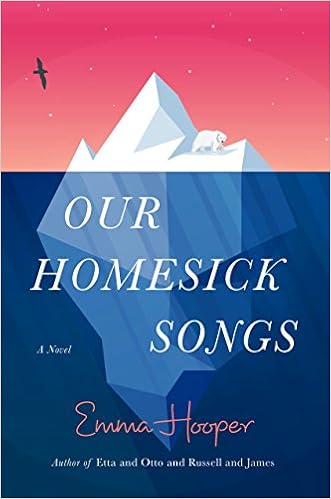 Because Newfoundland
is my favourite Canadian province, I love reading novels set there and was
thrilled to come across this book.
Because Newfoundland
is my favourite Canadian province, I love reading novels set there and was
thrilled to come across this book.
The setting is the
outport of Big Running in the early 1990s.
The cod have disappeared and so people are leaving the community to make
lives elsewhere. The Connors are the
last family to remain, though Aiden and Martha take turns working in the oil
fields of Alberta. Each leaves the
family in the care of the other parent for a month. Meanwhile 14-year-old Cora transforms
abandoned houses into countries she dreams of visiting. And 10-year-old Finn makes it his mission to
lure back the fish, using a folk tale for inspiration.
Sadness permeates the
narrative. Finn witnesses the
disappearance of fish and boats and people, including members of his
family. The government has told the
family they have only months to leave so they mourn the loss of the only home
they’ve known as well as their way of life.
Clenched hands become symbols of the tension everyone feels and the
desire to hang on to the life they love.
When Aiden and Martha were courting, “In clenched fists, Martha would
bring Aiden sea glass, round and smooth and blue and green and clear as
sky. Mermaid’s tears, they called them,
in the Runnings. Cried for people left
back onshore, hardened by distance.”
Throughout her absences from home, Martha keeps a clenched fist: “Her left hand, the one with the ring . . .
in a tight fist. A hard, safe
ball.”
Music is also ever
present. Aiden sang when he went fishing
and that singing, which Martha interpreted as coming from mermaids, brought
them together. Cora plays the fiddle and
Finn, the accordion. Whenever members of
the community gather, they bring music.
At a funeral, “there were two fiddles, three guitars, one banjo, one
bodhran, three whistles, two accordions, and almost everyone singing”; at a
community meeting, “there were three fiddles and three guitars and two bodhrans
and four whistles and two accordions and one flute and one set of pipes.” Mrs. Callaghan, Finn’s music teacher, tells
him that “singing together makes you allies.
Automatically. Always.” and “Even
when you don’t have anything, you can always sing.”
In particular, Mrs.
Callaghan talks about the power of music to help remember a place. She speaks of sailors coming from Europe to
fish and “the only, the best, way for them to remember home was through
singing, through the songs and tunes they knew from home. When they were homesick, when they needed to
remember where they were from, they could sing to see, to remember. They could close their eyes to block out
where they were, and sing and remember where they used to be.” And singing together is even better: “Every new voice would make a bigger, better
picture of home, filling in some gaps, bits they might forget alone.” Though Big Running will be a deserted place,
its former residents can remember it through song.
The style is spare but
lyrical. Some passages, like the description
of a storm, are almost stream-of-consciousness:
“First the lightning, then the thunder, then the wind and the waves, the
waves and the wind and the night-white water, all of which were the same, all
one, pushing and reaching and pulling and pressing in on them, on every side,
wind, waves, water, everything wet and loud and black and white, deep night,
then light, then night, then light, and everyone was awake now, Aidan’s mouth
moving like talking but just the sound of the wind and the waves and the water,
just a moving mouth, only visible when the light hit, then gone again, his arms
up and grabbing things, something, a snake, a rope, just a rope, Martha
stepping out, toward him, black-white, the wind grabbing her hair, punching her
back, deep, heavy against her gut, and something, something else, on her arm,
pulling her back, a hand in unison with the wind, pulling her, sudden, and she
fell back, away from Aidan and back inside and the hatch banged shut.”
This is a haunting,
moving novel that will linger in my memory.
I recommend it being read while listening to some Newfoundland folk
songs by Great Big Sea or The Fables or Simani or The Punters. Or listen to “Grey Foggy Day” by Eddie Coffey
(https://www.youtube.com/watch?v=uY2nVUXeXzY) or “Saltwater Joys” by Buddy Wasisname
and the Other Fellers (https://www.youtube.com/watch?v=LZmQj5rRULU).
No comments:
Post a Comment